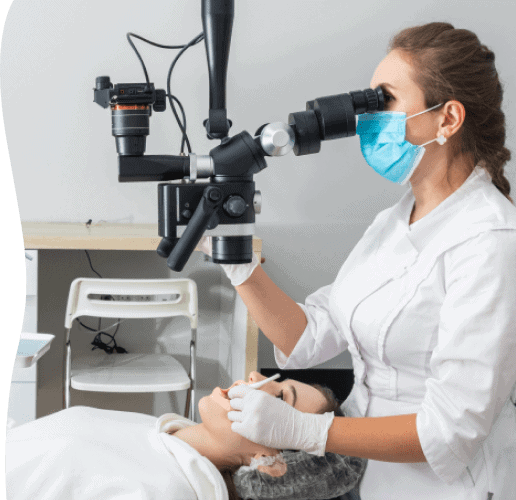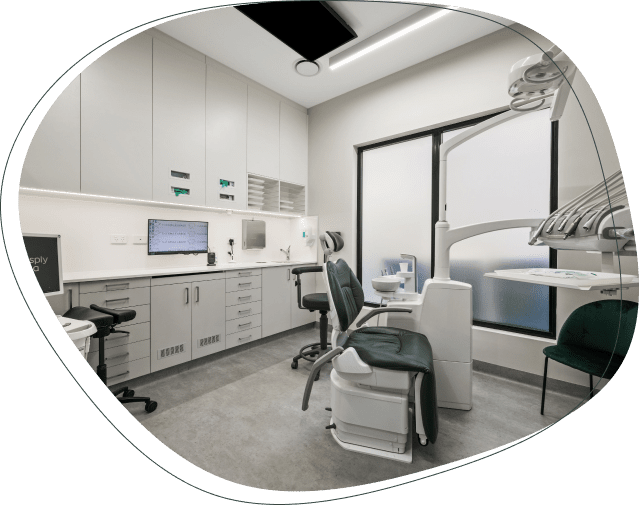Tooth Extractions
in Sutherland


We Take the Pain Out of Tooth Extractions and Make it Stress-free.
Tooth extraction procedures involve removing teeth from their sockets. The tooth is loosened with special instruments and then removed from its socket. There are various reasons why tooth extraction may be necessary, including excessive tooth decay, infection, and crowding.
The Smile Space offers tooth extractions in Sutherland. Tooth removal can be a daunting prospect, so we are here to make it as smooth and stress-free as possible. We only recommend pulling out of tooth when it’s absolutely necessary, and we will always exhaust all other treatment options first.
However, in some cases, an extraction may be the only way to improve your oral health. The dentist will administer local anaesthesia during the procedure for your comfort. Our team takes great care to perform extractions quickly and with minimal discomfort.
Advantages Of Tooth Extraction
Pain Relief
One of the main advantages of tooth removal is that it can provide relief from pain. This is often the case when a tooth is damaged or decayed. When these conditions are present, the nerve endings in the tooth can become irritated, causing pain.
There are times when the pain can be so severe as to interfere with daily activities. Pulling out of tooth removes the source of pain, providing much-needed relief.


Infection prevention
Tooth extractions can help prevent infection and inflammation. If a tooth is damaged or decayed, it provides an entry point for bacteria to enter the bloodstream. The infection can spread to the surrounding soft tissue and jawbone and lead to problems such as gum disease or even sepsis.
In addition, tooth extractions can also help to prevent inflammation caused by impacted teeth. By removing the offending tooth, you can help to prevent these serious problems.
Keep neighbouring teeth healthy
Tooth extractions can help prevent further damage to the neighbouring teeth. When a tooth is damaged or decayed, bacteria can enter the pulp chamber and cause an infection. If the damaged tooth is left in place, this infection can spread to adjacent teeth and lead to more serious health problems.
Therefore, by extracting the damaged tooth, you can help preserve the health of your other teeth and protect your oral health.


Alleviate overcrowding
Extracting a tooth can also help improve the appearance of the smile. For dental patients with overcrowded teeth, pulling out of tooth may be recommended to alleviate overcrowding and create more space.
It can be done to prepare for orthodontic treatment, such as braces or Invisalign. It can also make brushing and flossing easier. Extracting the problem tooth can help to provide a more aesthetic appearance and lead to better overall oral health.
Get Outstanding Dental Care with Us Today
At The Smile Space, we believe that comprehensive dental care should be accessible to everyone. Our experienced team is dedicated to providing the highest standard of care, using the latest technology and techniques. If you're looking for a dentist in Sutherland, book an appointment at The Smile Space today!

Why Choose
The Smile Space
 Warm, Friendly, and Highly Experienced Dental Team
Warm, Friendly, and Highly Experienced Dental Team
 We are Your One-Stop Shop For All Your Dental Needs
We are Your One-Stop Shop For All Your Dental Needs
For tooth removal in Sutherland, choose The Smile Space. We offer a wide range of other dental care services so that we can take care of all your oral health needs.
 Modern and State-of-the-Art Dental Technology
Modern and State-of-the-Art Dental Technology
The experienced dentists at our dental clinic use modern and state-of-the-art dental technology to make tooth extractions in Sutherland efficient and comfortable. You’re in good hands at The Smile Space.
 We Accept All Health Funds and Offer Quick and Easy Claims Through HICAPS
We Accept All Health Funds and Offer Quick and Easy Claims Through HICAPS
We accept all health funds to make high-quality dental services accessible. Our quick and easy claims through HICAPS will make your tooth removal in Sutherland as convenient and stress-free as possible.

Frequently Asked Questions
About Tooth Extraction
How do I prepare myself for a tooth extraction procedure?
A dental extraction is a relatively straightforward procedure, but there are a few things you can do to make everything go smoothly.
- Ask your dentist any questions you have about the procedure. No question is too small! The more informed you are, the better you can prepare.
- It is important to disclose your medical history and current health status to minimise complications. Communicate your medical history to your dentist in full detail, as well as any health conditions you have that might be relevant.
- Check with your health fund to see if you are covered for the procedure. You may need approval from your health fund before the dental procedure can be performed. Be sure to bring your health fund card with you on the day of your appointment.
- Refrain from smoking on the day of your extraction. Smoking slows the healing process and increases the risk of complications.
- Finally, be sure to have somebody who will drive you to and from the dental clinic, as anaesthesia can make it unsafe for you to drive for 24 hours after the procedure.
Do tooth extractions hurt?
Modern dentistry has come a long way in reducing the pain and discomfort associated with tooth extractions. During the extraction procedure, your dentist will administer local anaesthesia to numb the area around your tooth. It will minimise pain during the extraction.
Your dentist may also prescribe pain relievers to help manage residual discomfort after the procedure. With today’s advances in dental technology, there’s no need to worry about pain when getting a tooth pulled.
How will my dentist perform a tooth extraction procedure?
The extraction process begins with numbing the area around the tooth. In most cases, the extraction will require only local anaesthesia. However, in some cases, general anaesthesia may be necessary. Using dental forceps, the dentist will rock the tooth back and forth to widen the socket and remove the tooth.
For some patients, the dentist may need to make an incision in the gums and break the tooth into smaller pieces before it can be extracted. The socket will then be cleaned and sutured closed.
Are there any restrictions after tooth extraction?
After you have a tooth extracted, taking care of the extraction site as you heal is important. This means avoiding anything that could disrupt the clotting process and slow down healing. For a speedy recovery, here are a few things you should avoid doing after getting a tooth pulled:
- Avoid brushing directly over the extraction site for the first few days after tooth extraction. It can irritate the area and cause bleeding.
- Strenuous activity should be avoided for at least two days as it can increase bleeding and slow the healing process.
- Don’t eat hard and crunchy foods for the first few days, as they can also cause irritation and bleeding.
- Avoid drinking through straws, as the suction can cause the clot to become dislodged.
- In the first 48 hours after surgery, it’s recommended to avoid smoking as it decreases blood flow to the area and slows down healing.
How long will my gums heal after tooth extraction?
Gums can take a few weeks to a few months to heal after tooth extraction. The type of extraction, the size of the tooth, and the number of tooth roots all play a role in how long it takes for the gums to heal. For example, a simple extraction will heal faster than a surgical extraction.
Additionally, the gums will often heal faster after the extraction of a small tooth than after the extraction of a large tooth. Finally, healing times will generally be shorter when there is only one tooth root instead of multiple tooth roots. All of these factors must be taken into account when considering how long it will take for the gums to heal after tooth extraction. However, gums generally show signs of healing within a few days and will fully heal within a few weeks to a few months.
Can I sleep soundly after tooth extraction?
After having a tooth extracted, getting a good night’s rest is important so your body can heal properly. Whether or not you can sleep soundly after a tooth extraction depends on how well you take care of the extraction site. Here are some tips for sleeping soundly after tooth extraction:
- Sleep with your head elevated on extra pillows.
This will help the blood clot and promote healing. It would help if you slept elevated for the first 2-3 nights. - Take pain medication as prescribed by your Sutherland dentist.
It will help you to relax and get a good night’s sleep. - Sleep in a conducive environment.
Make sure the room is dark and quiet, and consider using a fan or white noise machine to help you fall asleep. Sleep is essential for healing, so do whatever you can to make it easier on yourself.


